

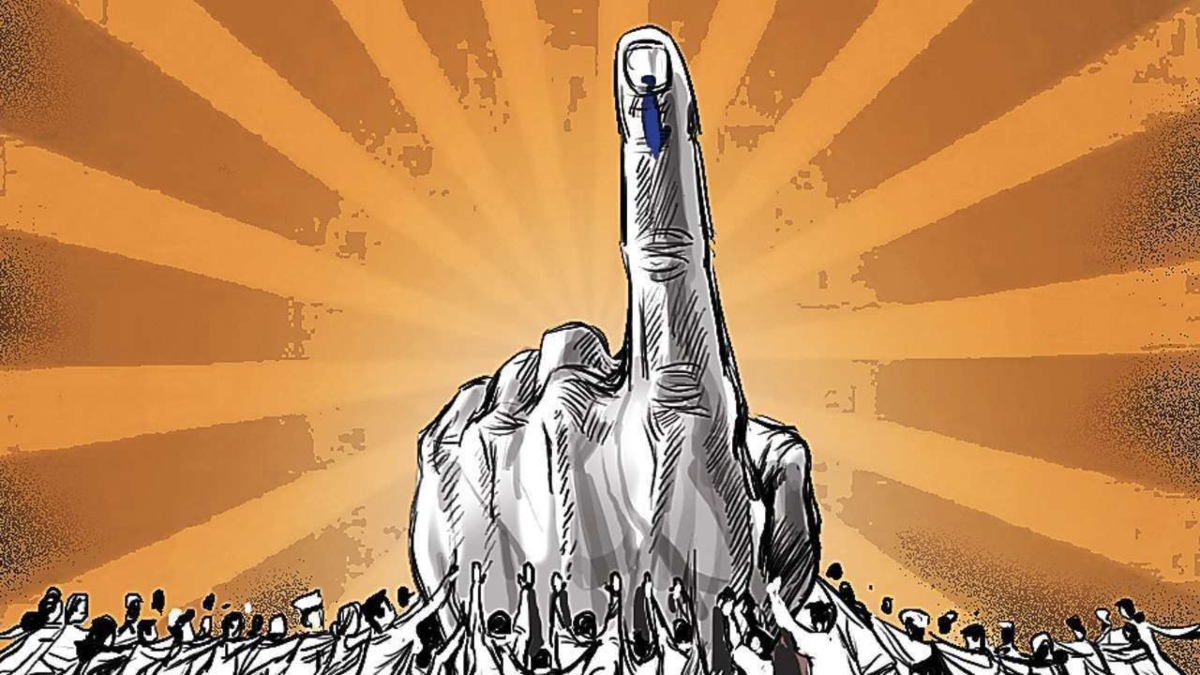

WEST BENGAL: DIDI’S THIRD TERM
In a widely scrutinized and highly contested battle, incumbent Chief Minister Mamata Bannerjee led the All India Trinamool Congress (AITC) to victory in the 2021 Assembly Elections. Despite having to battle against high anti-incumbency sentiments, electoral machinery of the BJP, and some widely publicised defections from top party aides, Banerjee successfully led the AITC to victory, securing 213 out of the 292 seats that went to poll. The AITC managed to increase its seat share by 2 seats and it’s vote share also increased to 47.95% this time, a surge from 2019 (43.70%) and 2016 (45.60%).

Although the Chief Minister lost her own seat, Nandigram, to long-time protege and now BJP member Suvendu Adhikari with a margin of merely 1,736 votes, the party’s large scale victory is all anyone can seem to talk about. What is also noteworthy is that the party also managed to secure a victory in minority-dominated regions of Malda and Murshidabad, which directly affected the Left-Congress’ position.
The BJP, which emerged as the principal opposition party, failed to secure the kind of victory it hoped for and had to settle with 77 seats and a vote share of 38.12%. In 2016, the BJP had managed to secure just 6 seats and a vote share of 10.80%. This changed significantly during the 2019 Lok Sabha elections, when the party, which had almost no political footprint in the state secured 18 seats. However, the party’s vote share has come down by 2.58% from 40.7% votes in 2019 to 38.12% in 2021. The 18 seats won by the BJP account for about 121 Assembly seats, out of which it was only able to retain only half of the seats, and the TMC won the remaining 60. In addition to this, the BJP’s vote share in those seats also fell by 10% from 2019 to 2021.
Given the high intensity campaign of the BJP, using star campaigners such as Prime Minister Modi and Home Minister Amit Shah, the party failed to reach anywhere near the mark of 200 it had speculated. Undoubtedly, the party’s failure to have a clear Chief Ministerial candidate and public failure in containing the second wave of the Covid-19 crisis has played a role in the elections.
The Left-Congress-ISF alliance or the Sanjukta Morcha, locally called the jot, was nearly wiped out in the state, managing to win just one seat and securing a combined vote share of 8.6%.
The Left Front, which ruled the state for 34 years until Mamata Bannerjee unseated it in 2011, not only fell drastically short of its 2016 vote share of 21.18% but also failed to retain its vote percentage from the 2019 Lok Sabha elections. Both the Left and the INC will not have even one single MLA in the 294 seat assembly, with the only seat that the Samyukta Morcha will represent being in favour of ISF chairman Naushad Siddique from Bhangar.
ASSAM: BJP’S SILVER LINING IN 2021
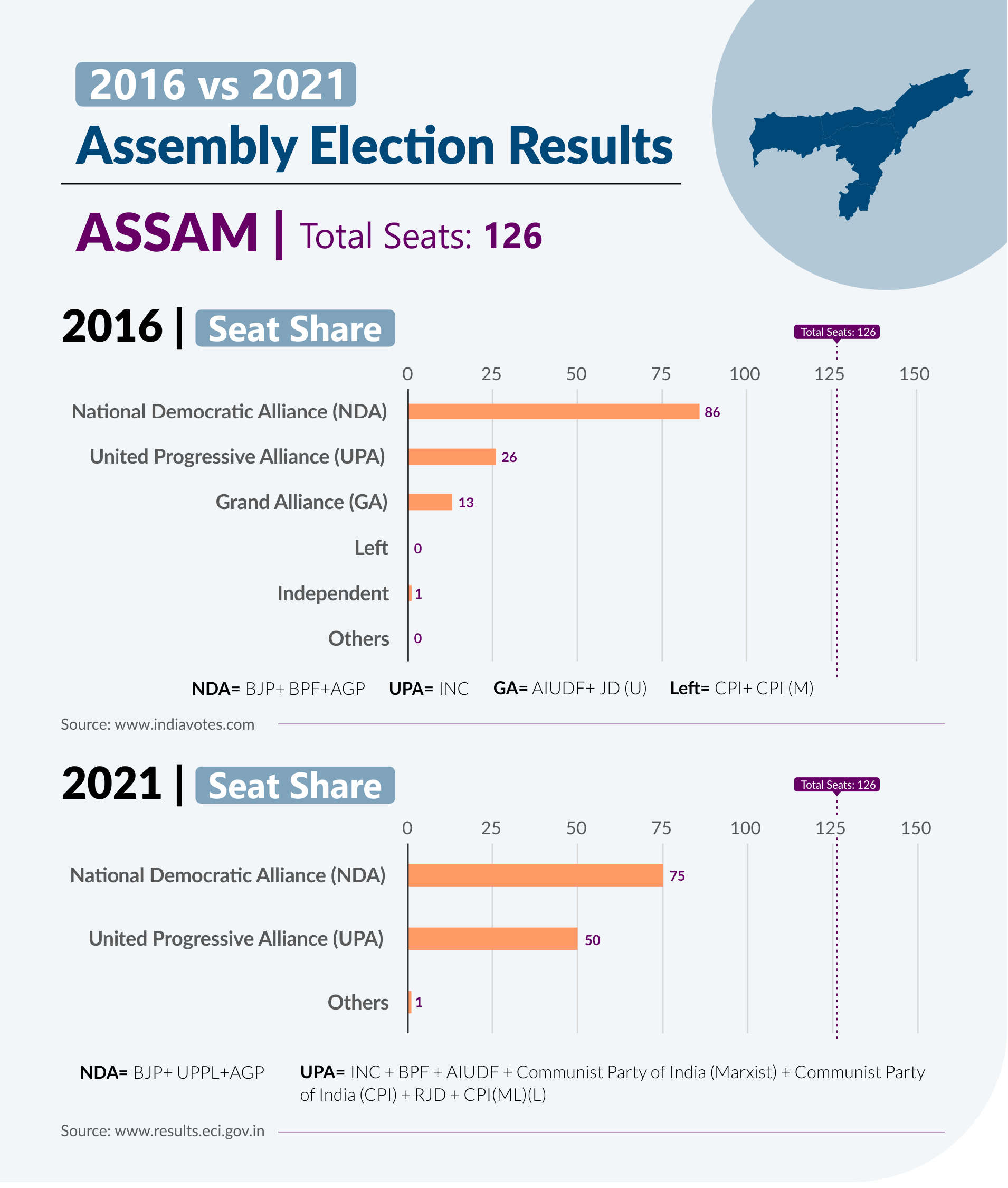
As the counting of votes continued on May 2nd, perhaps the victory in Assam was the only consolation for the BJP, as it secured a very comfortable win in the state election. While the anti-CAA and NRC protests led to the emergence of new parties and alliances such as the United Regional Front and the Congress’s Mahajot in an effort to win the state back, BJP managed to keep control of the state, winning a staggering majority of 75 seats in the 126 seat assembly.
However, this marks a loss of 11 seats since the last time when the alliance secured a win in 74 seats and a vote share of 38% (excluding 12 seats and 4% vote share of BPF). Individually, the BJP maintained its previous tally of 60 seats but increased its vote share from 29.8% in 2016 to 33.21% in 2021. When compared to its 2019 vote share, the BJP lost 3.19%.
Pre-poll alliances also saw major shifts when BJP’s long-time ally Bodoland People’s Front (BPF) left the NDA to join the UPA. The party’s seat share reduced from 12 seats in 2016 to 4, and its vote share also declined from 4% in 2016 to 3.39% in 2021. The Congress, which was fighting to gain back power in the state only managed to secure 29 seats, increasing its seats in the assembly by 3, whereas its vote share came down slightly with a loss of 1.63% (29.7% vote share in 2021). Its ‘Mahajoth’ allies AIUDF won 16, and Bodoland People’s Front bagged four seats with a combined vote share of 12.68%. The Communist Party of India (Marxist) secured one seat with 0.84% of votes whereas the Communist Party of India (CPI) failed to gain a seat.
Although the BJP-led NDA is slated to form a government for the second consecutive term, it is unclear if incumbent CM Sarbananda Sonowal (who won from Majuli) will continue in his position. This is even more uncertain since after the former Congress leader Himanta Biswa Sarma joined the BJP in 2015 and has bagged the Jalukbari seat with a margin of over one lakh votes and won an assembly seat for the fifth consecutive time and has a key role in expanding the party’s fortunes in the state.
TAMIL NADU: MK STALIN FINALLY SET TO BE CHIEF MINISTER
MK Stalin, the son of Muthuvel Karunanidhi and the leader of the DMK, will finally take his position as the Chief Minister of Tamil Nadu, a position that he has perhaps been waiting for over two decades. Breaking the 10 years of AIADMK rule in the state, the DMK-led alliance has secured a majority in the state, winning 159 seats in the 234 seat assembly. The elections also reaffirm the bipolar nature of politics in the state as there will be no candidate from outside the two dominant alliances led by DMK and AIADMK, represented in the legislative assembly.
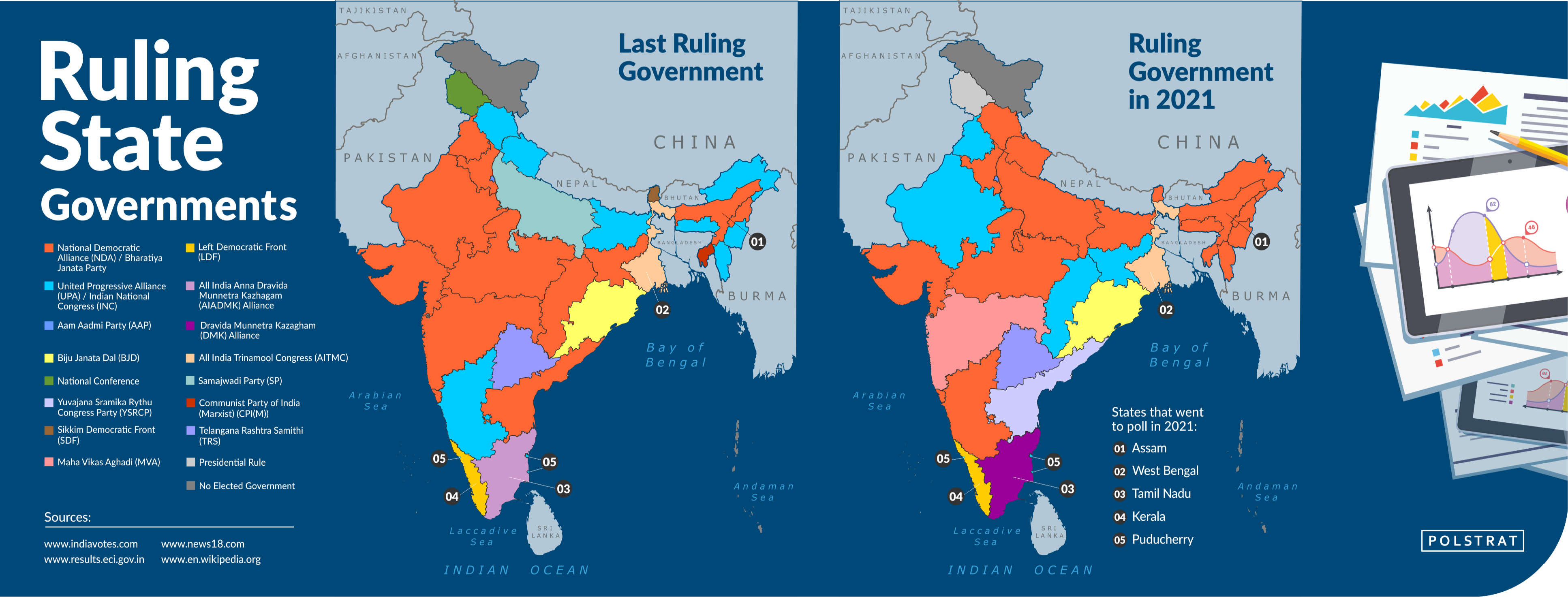
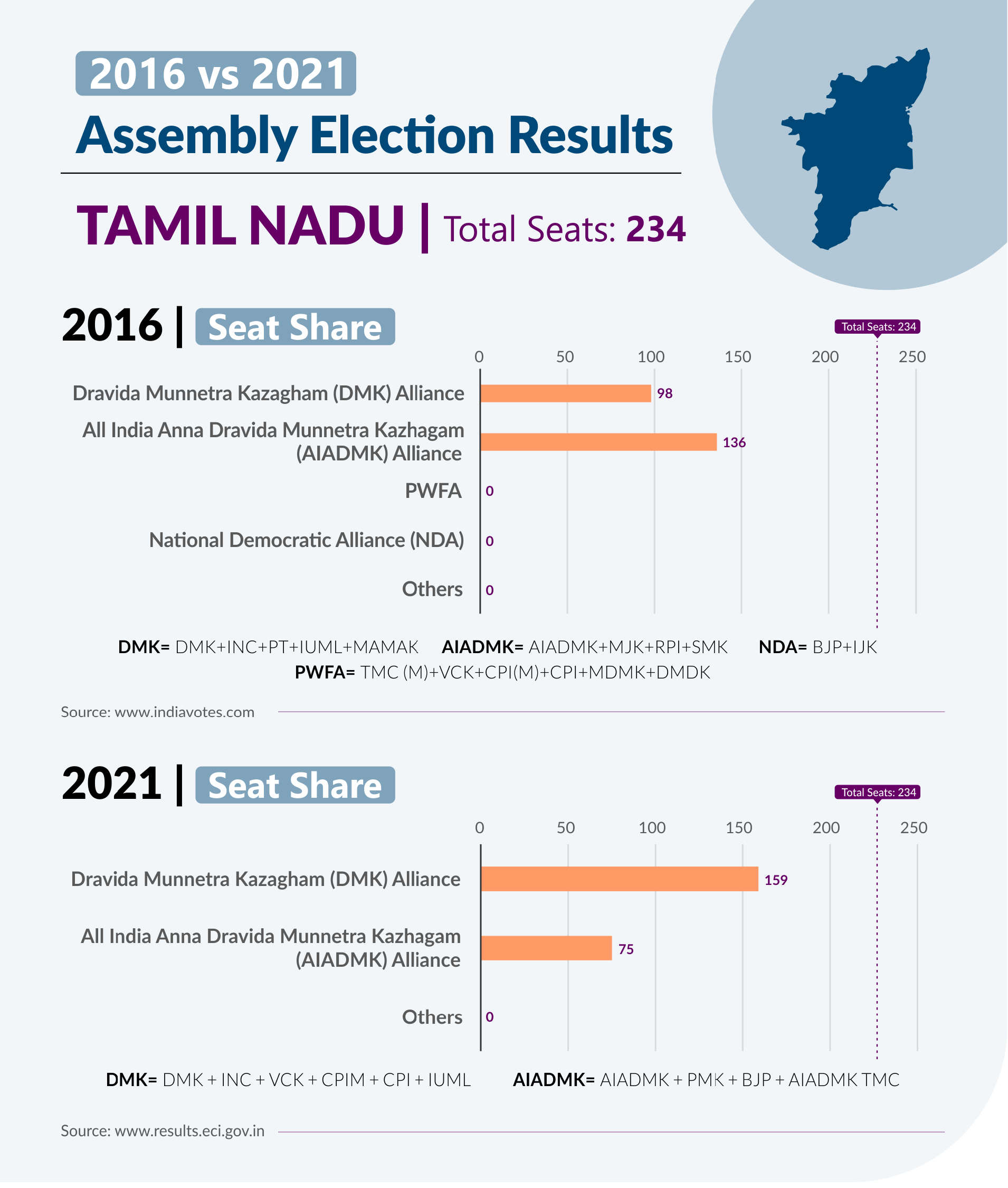
The results mark the rise of the DMK alliance since the 2019 LS elections when it wiped out the AIADMK-led NDA by winning 35 of 38 seats leaving just one seat for the NDA. The DMK individually won 133 seats in the 2021 elections, marking an increase of 44 seats from the 89 seats it secured during the 2016 elections. The DMK-led alliance’s vote share has increased from 39.30% in 2016 to 44.39%, however, it has declined from the 50.90% it managed to secure during the 2019 Lok Sabha elections. The INC, which is also a part of the DMK alliance has increased its MLA count in the state to 18. However, its vote share has declined from 6.5% in 2016 to 4.28% this time.
Although the AIADMK-led NDA managed to secure 75 seats in 2021, this was a major decline from the 126 seats it secured in 2016. In terms of vote share, the NDA, which includes AIADMK, BJP & PMK, bagged 39.72%, a rise of nearly 9.02% points from 30.70% in 2019. When compared to 2016, the alliance clocked a loss of a small 2.08% from 41.80% in 2016. The BJP opened its account in the state for the first time in 20 years by winning 4 seats with a vote share of 2.63% which was still a drop from 3% in 2016.
Although around 14.46% of the vote share went to parties other than those in the two major alliances, they will not be sending any MLA to the assembly. Popular actor Kamal Hassan who floated his own party Makkal Nidhi Maiam failed to win any seat in the 234 seat assembly. Similarly, The TTV Dhinakaran-led AMMK and its alliance partner Vijayakant-led DMDK also failed to gain a single seat in the assembly.
KERALA: LDF BREAKS 40-YEAR CYCLE OF ANTI-INCUMBENCY
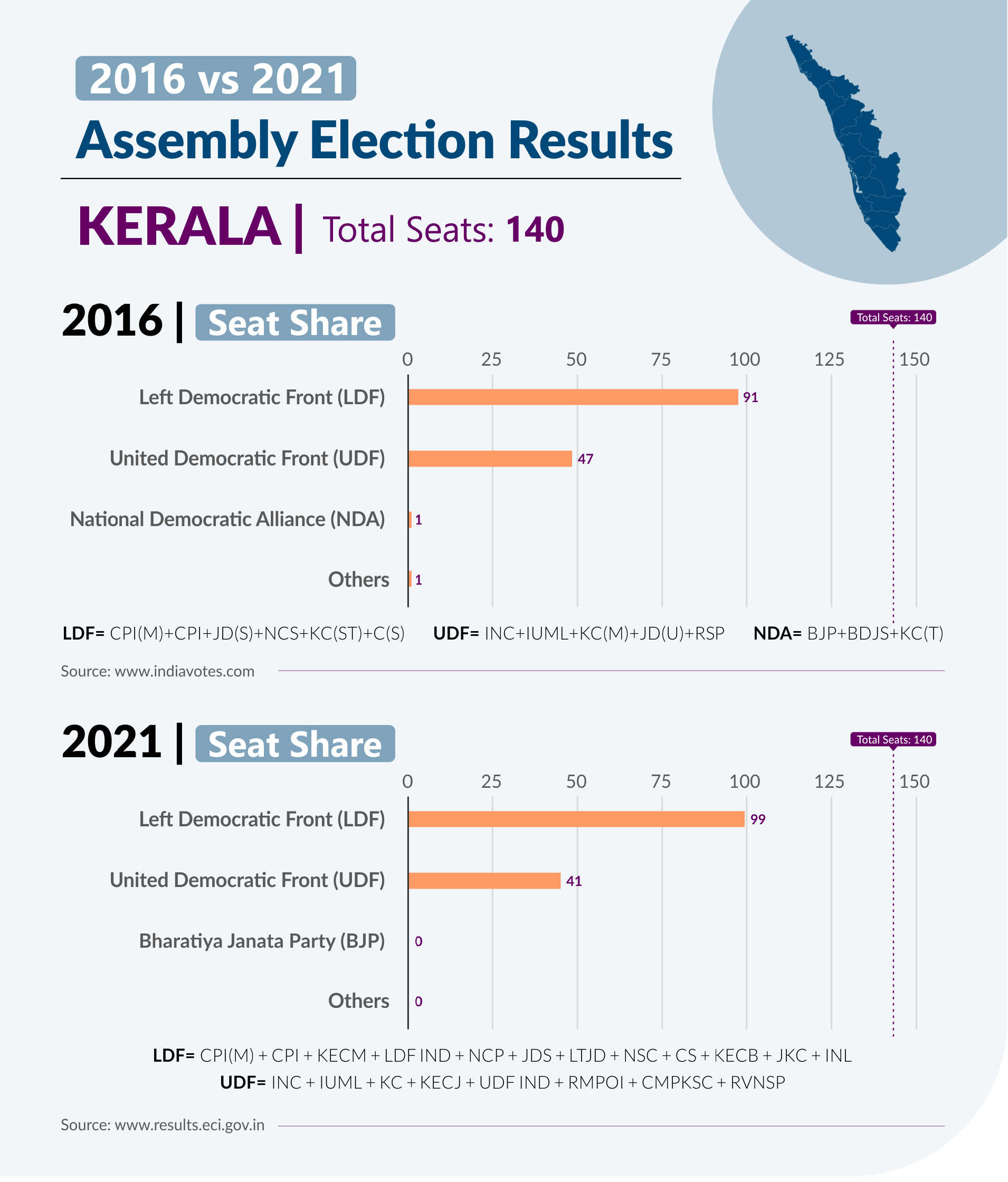
Marking a huge change in politics, the state, for the first time in 40 years is slated to beat anti-incumbency and elect the same party to power for a second consecutive term. The incumbent Left Democratic Front (LDF) led by 76-year-old CPI(M) leader Pinarayi Vijayan won 99 seats in the 140 seat assembly, a gain of 8 seats from the last assembly elections. The LDF, which had managed to secure a vote share of 43.48% in 2016, increased it to 47.60% in 2019, however, this has now dropped again to 37.5% in 2021.
The main opposition alliance, the United Democratic Front (UDF) led by Congress focused its campaign in the state on highlighting the “mistakes” of the LDF government, including the gold smuggling scandal and the Sabarimala verdict. However, it only managed to secure 41 seats, a fall of 6 seats as compared to 2016. The UDF’s vote share also declined from 38.81% in 2016 and 47.60% in 2019 to 36.6% this time. The INC, which individually won 22 seats in 2016 saw a loss of 1 seat this time but increased its vote share by 1.32% to 25.12%. When comparing to its vote share of 37.5% in 2019, the party was at a major disadvantage.
The BJP-led NDA which had one seat in 2016 with a vote share of 14.96% failed to retain it, winning no seats at all this time, and bagging a reduced 11.30% vote share despite the party sending major names like Prime Minister Narendra Modi and Amit Shah to rally for the candidates in the state.
PUDUCHERRY: CONGRESS FAILS TO WIN BACK ITS LAST SOUTH CITADEL

The INC government in the Union Territory of Puducherry, which was one of the last citadels of the Congress in the south, collapsed a month before the U.T. was set to go to polls. The U.T., which was currently under President’s Rule opted for a change in government, with the All India N.R. Congress (AINRC) winning 16 seats. The contest in Puducherry was a two-pronged battle between the Congress-DMK alliance and the National Democratic Alliance (NDA) comprising the All India NR Congress (AINRC), the All India Anna Dravida Munnetra Kazhagam (AIADMK) and the Bharatiya Janata Party (BJP).
As a part of the NDA, the AINRC individually won 10 seats, while the BJP won 6. The AIADMK, which is also part of the alliance, did not manage to secure a single seat in the state. The DMK and the Congress, on the other hand, won six and two seats respectively. This was a decline for the INC, which had wrested control of the U.T. from the AINRC in 2016, managing to secure 15 seats, and forming a government with the support of the DMK, which had won 2 seats.
WITH CONTRIBUTIONS FROM DAMINI MEHTA, JUNIOR RESEARCH ASSOCIATE AT POLSTRAT.